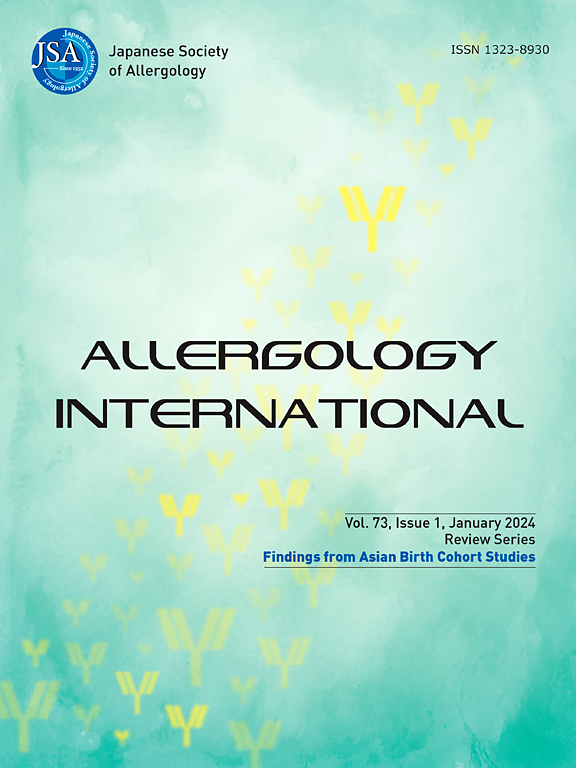用2型生物标志物预测杜必鲁单抗的疗效:一项关于严重哮喘的真实世界研究。
IF 6.2
2区 医学
Q1 ALLERGY
引用次数: 0
摘要
背景:杜比单抗治疗重症哮喘在真实世界环境中的疗效尚未在多个机构中进行前瞻性研究,其疗效的预测因素仍存在不确定性。我们的目的是评估杜必鲁单抗的有效性,并利用两种 2 型生物标志物确定其在实际环境中的有效性预测因素:方法:这项前瞻性多中心研究纳入了103名重症哮喘患者。这项前瞻性多中心研究纳入了 103 名重症哮喘患者,对他们的病情加重情况和呼吸功能进行了为期 24 周的监测。使用哮喘控制问卷-5 评估哮喘控制情况。临床症状及其对咳嗽和咳痰的影响通过咳嗽和咳痰评估问卷(CASA-Q)进行评估。根据基线时的 FeNO 水平和血液嗜酸性粒细胞计数对 2 型生物标志物进行了分组分析:结果:使用dupilumab治疗可减少病情恶化,提高哮喘控制率、FEV1和CASA-Q评分。FEV1的改善与CASA-Q中痰域的改善相关。FeNO 水平和血液嗜酸性粒细胞计数升高的患者 FEV1 的改善更为显著。嗜酸性粒细胞计数升高组的 CASA-Q 痰域得分明显更高。回归分析表明,FeNO水平和血液嗜酸性粒细胞计数可显著预测FEV1的改善,血液嗜酸性粒细胞计数还可预测使用杜匹单抗治疗的患者痰液的改善:结论:在现实世界中,2型生物标志物可作为接受杜比单抗治疗的重症哮喘患者FEV1和痰液改善情况的指标。本文章由计算机程序翻译,如有差异,请以英文原文为准。

Predicting dupilumab effectiveness with Type-2 biomarkers: A real-world study of severe asthma
Background
The therapeutic effectiveness of dupilumab for severe asthma in real-world settings is yet to be prospectively investigated across multiple institutions, and uncertainties persist regarding predictive factors for its effectiveness. We aimed to assess the effectiveness of dupilumab and identify predictors of its effectiveness in real-world settings using two type-2 biomarkers: FeNO concentration and blood eosinophil count.
Methods
This prospective multicenter study included 103 patients with severe asthma. Exacerbations and respiratory functions were monitored for 24 weeks. Asthma control was evaluated using the Asthma Control Questionnaire-5. Clinical symptoms and their impact on cough and sputum were assessed using the Cough and Sputum Assessment Questionnaire (CASA-Q). Subgroup analyses of type-2 biomarkers were conducted based on FeNO levels and blood eosinophil counts at baseline.
Results
Treatment with dupilumab led to a reduction in exacerbations and enhancement in asthma control, FEV1, and CASA-Q scores. FEV1 improvement was correlated with enhancement in the sputum domain of the CASA-Q. Patients exhibiting elevated FeNO levels and blood eosinophil counts demonstrated more significant enhancements in FEV1. CASA-Q sputum domain scores were significantly higher in the group with elevated eosinophil counts. Regression analysis revealed that FeNO levels and blood eosinophil counts are significant predictors of FEV1 improvement, with blood eosinophil counts also predicting sputum improvement in patients treated with dupilumab.
Conclusions
Type-2 biomarkers may act as indicators of improvement in FEV1 and sputum outcomes among patients with severe asthma undergoing dupilumab treatment in real-world settings.
求助全文
通过发布文献求助,成功后即可免费获取论文全文。
去求助
来源期刊

Allergology International
ALLERGY-IMMUNOLOGY
CiteScore
12.60
自引率
5.90%
发文量
96
审稿时长
29 weeks
期刊介绍:
Allergology International is the official journal of the Japanese Society of Allergology and publishes original papers dealing with the etiology, diagnosis and treatment of allergic and related diseases. Papers may include the study of methods of controlling allergic reactions, human and animal models of hypersensitivity and other aspects of basic and applied clinical allergy in its broadest sense.
The Journal aims to encourage the international exchange of results and encourages authors from all countries to submit papers in the following three categories: Original Articles, Review Articles, and Letters to the Editor.
 求助内容:
求助内容: 应助结果提醒方式:
应助结果提醒方式:


